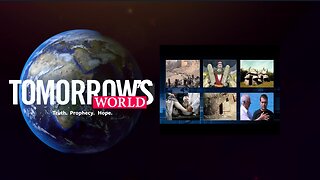Premium Only Content

A New Era Awaits: A Future of Peace and Prosperity in the Kingdom of God
To learn more about the Gospel Jesus Christ taught get Your Free Booklet: "The World Ahead: What Will It Be Like?" https://bit.ly/3U4b1mp Why is this free? We are determined to follow Jesus’ command too "freely give" (Matthew 10:8).
In Mr. Ames' compelling exposition, he embarks on a multifaceted journey through the depths of biblical prophecy, intertwining it with contemporary realities to illuminate the intricacies of eschatological discourse. Setting the stage with a poignant reflection on the prevailing sense of foreboding amplified by modern media narratives and the ominous symbolism of the Doomsday Clock, he invites his audience to contemplate the existential significance of these dire warnings in light of timeless biblical teachings.
As he navigates the labyrinthine passages of scripture, Mr. Ames deftly guides his audience through the prophetic utterances of Jesus Christ, notably drawing attention to the enigmatic prophecy of the Great Tribulation. Through meticulous exegesis of Matthew 24 and its parallel passages, he unveils the layers of meaning embedded within Jesus' warnings, offering a nuanced interpretation that transcends mere sensationalism to reveal profound insights into the human condition and the divine providence that governs history.
Central to Mr. Ames' exposition is the juxtaposition of impending calamity with the redemptive promise of divine intervention. With a scholar's precision and a pastor's heart, he unpacks the paradox of suffering and salvation, weaving together threads of hope and despair to craft a tapestry of theological reflection that resonates deeply with the human experience.
Transitioning seamlessly into a discussion of the gospel message, Mr. Ames invites his audience to grapple with the existential implications of multiple interpretations and competing doctrines. Through the lens of Paul's epistolary admonitions to the Corinthian church, he underscores the urgent need for discernment and fidelity to the authentic gospel proclaimed by Jesus Christ—a gospel characterized by its uncompromising call to repentance, its transformative promise of salvation, and its vision of a kingdom yet to come.
Indeed, it is this vision of the kingdom of God that forms the bedrock of Mr. Ames' theological exposition. With exegetical acumen and rhetorical flair, he unveils the eschatological horizon, painting a vivid portrait of a future characterized by the reign of Christ and the establishment of God's righteous rule on earth. Drawing upon a rich tapestry of biblical imagery—from the prophetic visions of Isaiah and Ezekiel to the apocalyptic imagery of Revelation—Mr. Ames invites his audience to envision a world transformed, where swords are beaten into plowshares, and the lion lies down with the lamb.
Yet, amidst the grandeur of this eschatological vision, Mr. Ames does not shy away from the stark realities of human sin and frailty. With prophetic urgency, he calls his audience to repentance and renewal, challenging them to heed the call of the gospel and embrace the transformative power of God's grace.
In conclusion, Mr. Ames' exposition stands as a testament to the enduring relevance of biblical prophecy in an age of uncertainty and upheaval. With erudition and eloquence, he illuminates the path forward, offering both a sobering appraisal of present realities and a luminous vision of hope anchored in the promises of God's kingdom. Through his impassioned plea for fidelity to the gospel message and his unwavering commitment to biblical truth, he beckons his audience to embark on a journey of spiritual awakening and renewal—a journey that leads from darkness into light, from despair into hope, and from death into life everlasting.
Questions that this video will answer.
1. What is the significance of the Doomsday Clock and its current setting as of January 2024?
2. How does Jesus Christ's prophecy in Matthew 24:22 offer hope amidst apocalyptic warnings?
3. Why is discernment crucial in distinguishing the true gospel from various interpretations presented by different religious teachings?
4. How did the Apostle Paul caution against accepting alternative gospels, as seen in 2 Corinthians 11:2-4?
5. What transformative vision of the future does the Bible present, particularly regarding the establishment of God's kingdom and the role of faithful Christians in it?
-
 26:54
26:54
Tomorrow's World - Rumble
6 days agoThe Biblical Holy Days - Part 1
7 -
 38:07
38:07
Michael Franzese
3 hours agoLeaving Organized Crime and Uncovering Mob in Politics: Tudor Dixon and Michael Franzese
18.7K7 -
 2:42:54
2:42:54
Jewels Jones Live ®
1 day agoAMERICA IS BACK | A Political Rendezvous - Ep. 111
18.3K31 -
 LIVE
LIVE
Due Dissidence
1 day agoLIVE: Workers Strike Back Conference ft. Chris Hedges, Jill Stein, Kshama Sawant, and More!
1,611 watching -
 8:36:37
8:36:37
Right Side Broadcasting Network
5 days agoLIVE REPLAY: CPAC 2025 Day Three with President Donald J. Trump - 2/22/25
310K87 -
 1:05:34
1:05:34
The Big Mig™
11 hours agoConfirmed Kash Patel New FBI Director, Bring On The Pain |EP483
46.8K17 -
 53:59
53:59
Tactical Advisor
7 hours agoThe Vault Room Podcast 009 | Everyone Getting $5000?!
44.6K10 -
 2:04:44
2:04:44
TheAlecLaceShow
18 hours agoLive at CPAC | Interviews with Dean Cain, Rep. Comer and more! | The Alec Lace Show
57.2K3 -
 LIVE
LIVE
Major League Fishing
3 days agoLIVE Tackle Warehouse Invitationals, Stop 1, Day 2
309 watching -
 3:12:37
3:12:37
I_Came_With_Fire_Podcast
15 hours agoNOC Spy: CIA uses SATANIC RITUAL ABUSE to make SLEEPER Cells
56.3K9